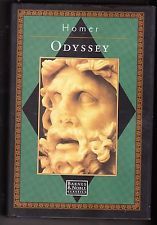 The Odyssey was my pick for the category "A book you should have read in school but didn't" for my 2016 reading challenge. Now, strictly speaking, I was never assigned The Odyssey to read. But every other English class in the 10th grade was. My teacher was just too busy having raptures about the hero's journey in Star Wars and having us make heraldic crests to actually assign it. (The only two books we actually read in this class were A Tale of Two Cities and Julius Caesar.) So, I thought this was a good chance to get around to it.
The Odyssey was my pick for the category "A book you should have read in school but didn't" for my 2016 reading challenge. Now, strictly speaking, I was never assigned The Odyssey to read. But every other English class in the 10th grade was. My teacher was just too busy having raptures about the hero's journey in Star Wars and having us make heraldic crests to actually assign it. (The only two books we actually read in this class were A Tale of Two Cities and Julius Caesar.) So, I thought this was a good chance to get around to it.The Odyssey is the second part of Homer's epics surrounding the Trojan War. While the first book, The Iliad, covers the war itself up until the Greeks hatch their plan to build the Trojan horse, The Odyssey is about the homeward journey of one of the Greek heroes, Odysseus, and the perils that befall him. From having his men ensnared by the Lotus-Eaters to having some fall pray to a multi-headed beast while attempting to dodge a whirlpool, bot being kept for years by the witch Circe and the nymph Calypso, it takes Odysseus twenty years to get home from Troy--and all the while his wife is being wooed by other suitors, and his son seems helpless to drive them off. Telemachus is actually the character we encounter before Odysseus, but he's pretty useless overall.
My translation was the Samuel Butler one, and it did have a few eye-raising moments in it that I'm pretty sure aren't in the original Greek. It started when the ocean was described as "blue"--this is a word that didn't really exist in ancient Greece, which is why the sea is always being described as "gray" and "wine-dark." But it really hit me when he described Odysseus' raft as being tossed around like a "shuttlecock," which I'm 100% positive was not a thing in ancient Greece. So, this translation, while I think it conveyed the story well enough, I wouldn't say it's likely to be 100% loyal to the original. It's also been converted into a prose format rather than remaining in that of an epic poem. This doesn't bother me because the rhyme scheme and rhythm of the original are disrupted through translation anyway and I prefer reading prose, but some people might take that into consideration. (It does seem that Barnes & Noble has switched to a different translation since the book that I read was published, so that's also to be taken into consideration.)
As for the story, while it's a solid tale of gods and monsters and heroes, there were a few things that rubbed me the wrong way. It was very repetitive; people seem to go from place to place, and in every new place they're asked what they've been up to, and they have to relate all the things they did at the last one. Also, it must have been terribly convenient for the Greeks to believe in gods that had tendencies to take the forms of people who actually existed--if anyone ever accused you of doing something wrong, you could say, "Oh no, that wasn't me, it must have been a god who looked like me!" Telemachus and Penelope are just "blah" as characters--though I liked how Penelope had schemed to keep from marrying any of the men continually harassing her, I don't have much to say for her doing not much else but crying for the past twenty years. It's also a story with a very violent ending, but I expected that. The only thing that surprised me was how little of the story actually had to do with Odysseus' trials on the way home--from the way people talked about this boo, I'd thought that would be all of the story, when in fact more of it actually has to do with Telemachus going from place to place and Odysseus making up stories so that people won't recognize him and scheming on how to get rid of the suitors in the most violent way possible. And ow my gosh, if I have to read about "The daughter of morning, rose-fingered Dawn," one more time I might just scream.
Overall, this is something that's worthy of reading, but I think a different translation might be a bit better.
3.5 stars out of 5.
No comments:
Post a Comment